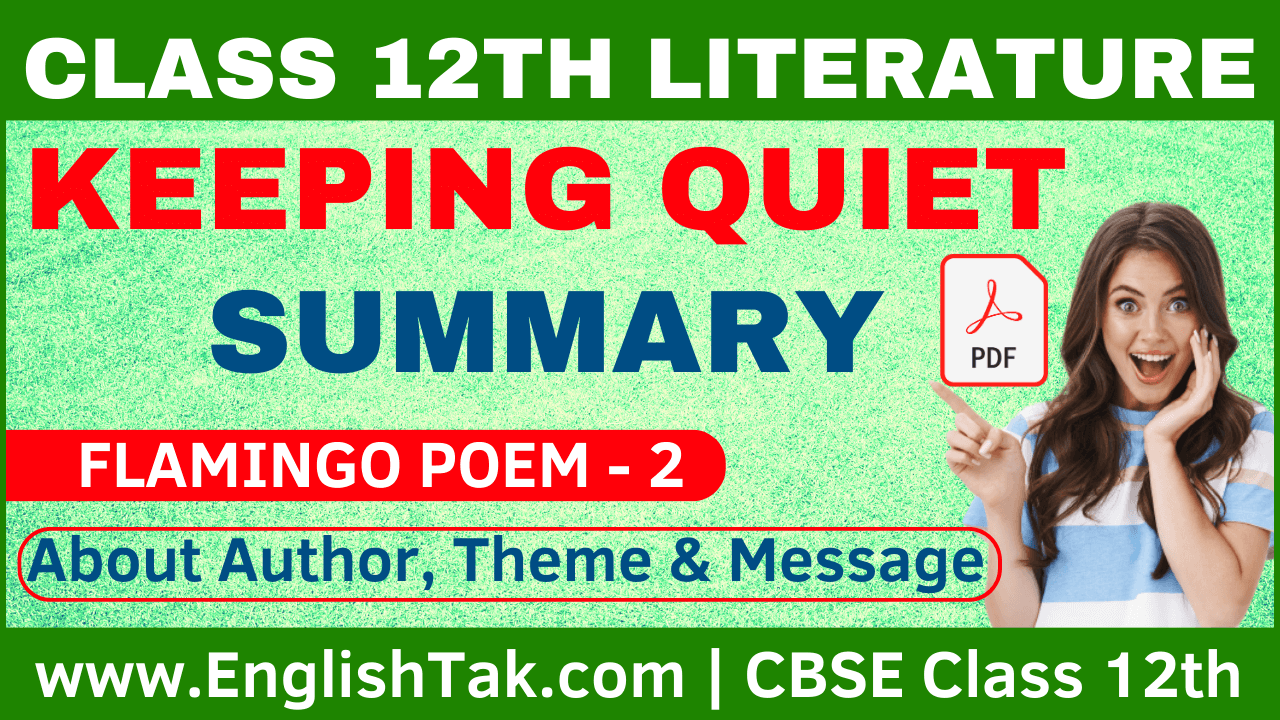![]()
Keeping Quiet Summary
Table of Contents
Keeping Quiet Summary – This summary is all about “Keeping Quiet.” It’s important for Class 12 students preparing for the 2023-24 Board Exam. To do well in the CBSE Board Exam, it’s crucial to understand and remember the information in this summary.
About the Author of Keeping Quiet
Pablo Neruda was the nickname and later the real name of a man from Chile who was a poet, diplomat (someone who talks to other countries), and politician. His regular name was Ricardo Eliécer Neftalí Reyes Basoalto. He picked the name Pablo Neruda because he liked a poet from the Czech Republic named Jan Neruda.
In 1971, Pablo Neruda got a big award called the Nobel Prize for Literature. It was a really special prize given to people who write amazing things.
Read these Posts
Theme of Keeping Quiet
The poet, Pablo Neruda, urges mankind to cease all activity for a little while. During these few moments of silence and inactivity, all human beings would be one, united, and in harmony with each other and nature. This togetherness and oneness is most desirable for the survival of the Earth and of human beings.
Neruda believes that the soul housed within the human body is capable of performing this feat if given a chance to shine out through introspection, for which absolute silence and stillness is essential.
Message of Keeping Quiet
‘Keeping Quiet’ leaves a message of universal brotherhood and peace. It urges people to stop all sorts of aggression, including that towards the environment. If we think of ourselves as the hands of the clock on the face of this Earth, moving in our routine ways, won’t it be a good thing to stop at twelve and do some introspection?
Justification of Title Keeping Quiet
The title itself suggests that the poet emphasises the importance of silence. Pablo Neruda wants people to stop what they’re doing and think about themselves. This thinking is important because it helps us understand that we need to stop hurting and destroying things. He wants us to live together peacefully and happily.
Read More
Job Application Format Class 12
Keeping Quiet Summary
The poet wants everyone to stop and be completely still for a few moments. He wants only quiet, no moving around, and a thoughtful mood. He doesn’t like everyday activities. He says we shouldn’t do things without thinking or speak in any language. He doesn’t want any distracting gestures either. He wants us to be completely silent and still.
He asks the readers to stay quiet for twelve seconds. The number twelve is important because it represents time and the months of the year.
The poet tells us not to ‘speak in any language’ and not to ‘move our arms’. To stop wars and destruction, man must put down his weapons. He has also used words like ‘once’ and ‘one second’ as he is appealing to the reader to do something that they have never done before.
This moment of complete inactivity would be an extraordinary, memorable or cherished moment. There would be no rush, no noise and no disturbance. Man would not have to cope with the fast pace of life. This would be a profound moment of bonding and togetherness. There would be complete relaxation of mind, body and soul.
Man will be united with the rest of the world by a common link of peace. The poet talks about a metaphorical concept when he says that fishermen would not harm marine life. ‘Cold sea’ denotes the coldness of fishermen who do not bother about protection of sea life and in moments of inactivity they would not be able to disturb the sea animals.
Keeping Quiet Summary Class 12
The salt gatherers would also stop to look at their calloused hands that hurt due to this activity. They too, would pause to think about their mindless activities and their effects.
The poet feels that the whole speculation of wars and their destructive qualities would be negated during those moments of silence. ‘Green wars’ refers to environment degradation caused by human activities, ‘wars with gases and fires’ refers to wars fought with nuclear and bio weapons. Man may get the satisfaction of being victorious but ironically, wars leave behind no survivors.
Those who wage wars would be cleansed of all the murk and dirt from their minds. They would then walk about with other individuals and exhibit amity, brotherhood and harmony. They would do nothing to harm mankind or nature.
The poet does not wish to advocate total inactivity or silence, which may be misunderstood and confused with death. Life continues to remain what we make of it. If we were not so concerned about keeping our lives active, i.e., doing things mindlessly and waging wars. We perhaps would not lose sight of our goals.
Our desire to achieve goals makes us single minded and desperate. It is then that we lose all perspective. The poet feels that silence for a while might alleviate sadness from our lives. Quiet productivity in place of all activities is desirable. The end of all activities does not mean death but just a break from the monotony of a stressful life.
The poet, in the last lines, feels that we can learn a lesson from the Earth. It can teach us how silence is productive. The Earth appears calm and quiet but is actually nurturing life. Things may die but are reborn and the cycle goes on because the Earth brings forth new life. The poet appeals to all human beings to make an effort to keep/quiet.
He has initiated the state of inactivity and now it is the human beings who can carry on with this idea while he makes a quiet exit.
Keeping Quiet Summary Pdf Download
Flamingo Class 12th Summary
The Last Lesson Summary in Hindi
My Mother at Sixty Six Summary
Lost Spring Summary Class 12 English
The Last Lesson Difficult Words Meaning





